Scar Revision
Always remember- once a scar, always a scar.
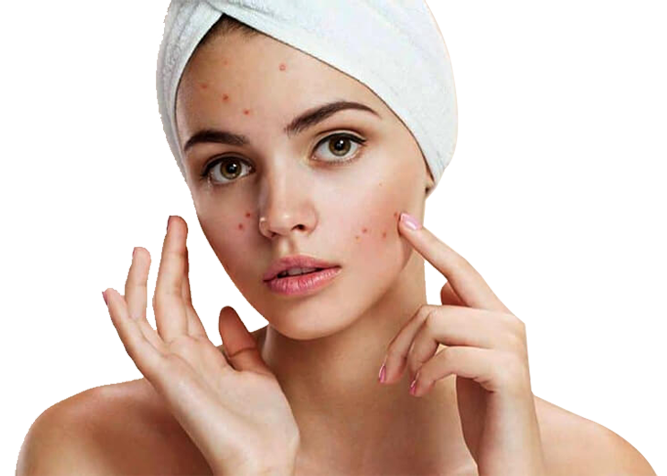
Most effective way for Scar Revision Treatment in India
What is a Scar?
Always remember- once a scar, always a scar. Though surgery, laser, or treatments can be done to minimize the appearance of the scar, a scar cannot be removed completely. Indian skin- scars more when compared with the skin of White people. Scars on their skin end up so thin that they are not visible to human eyes sometimes. But a little heavy scar is our genetics. We cannot change or run away from it.
Scars are visible signs that remain after a wound has healed. They are the unavoidable results of injury or surgery, and their development after the surgery or injury can be unpredictable. Poor healing may contribute to scars that are obvious, unsightly, or disfiguring. Even a wound that heals well can result in a scar that affects your appearance. Scars may be noticeable due to their size, shape, or location; they can also be raised or depressed and may differ in color or texture from the surrounding healthy tissue. Scar revision surgery will attempt to minimize a scar so that it is less conspicuous and blends in with the surrounding skin tone and texture.
Some of the different types of scars are
- Discoloration or surface irregularities and other more subtle scars can be cosmetically improved by surgery or other treatments recommended by Dr Amit Agarwal. These types of scars do not impair function or cause physical discomfort and include acne scars as well as scars resulting from minor injury and prior surgical incisions.
- Hypertropic scars are thick clusters of scar tissue that develop directly at a wound site. They are often raised, red and/or uncomfortable and may become wider over time. They can be hyperpigmented (darker in colour) or hypopigmented (lighter in colour).
- Keloids are larger than hypertropic scars. They can be painful or itchy, and may also pucker. They extend beyond the edges of an original wound or incision. Keloids can occur anywhere on your body, but they develop more commonly where there is little underlying fatty tissue, such as on the face, neck, ears, chest or shoulders.
- Contractures are scars that restrict movement due to skin and underlying tissue that pull together during healing. They can occur when there is a large amount of tissue loss, such as after a burn. Contractures also can form where a wound crosses a joint, restricting movement of the fingers, elbows, knees or neck.
What does the Discussion during a scar revision consultation should include?
- Discussion on the scar revision surgery goals.
- Chances of recurrence of scar
- Whether you are keloid thrower or not (susceptibility to hypertrophic scar)
- Any past medical conditions or surgeries.
- Any present illness, drug allergies and medical treatments.
- Any on-going supplements
- Alcohol, tobacco intake
A candidate opting for scar revision should fill up these criteria for better results
- You should have realistic expectations (most important).
- You should preferably be a non-smoker
- You should not have any major chronic illness or multiple medical condition.
- You do not have active acne or other skin diseases in the area to be treated
- You should be confident and positive about your looks to achieve the improvement of your appearance.
- You should be motivated enough to undergo the procedure.
What is Dr. Amit Agarwal's focus during scar revision consultation?
- Examine the scar, its dimensions, its depth, relation to vital structures or joint
- Discuss the options for your surgery
- Whether you are keloid thrower or not (susceptibility to hypertrophic scar)
- Take photographs
- Care of the scar after the surgery.
- Risk and complications associated with the procedure
- Outcome of scar revision surgery
Questions to be asked with Dr. Amit Agarwal about scar revision
- Are you a good candidate for the procedure?
- How and where will you perform the surgery?
- What are the risks and complications related to the surgery?
- How long will be my recovery period?
- How long do I have to stay at the centre?
- What restrictions will I have after surgery?
- When can I return to work and other activities?
- When can I shower after scar revision surgery?
- How should I care for my incisions?
- How will my scar look after surgery?
What are the Preparations to be done for the surgery?
- Get the tests done which are prescribed by Dr Amit Agarwal.
- Monitor your current medication after discussing it with your doctor.
- Stop smoking at least two weeks prior to surgery.
- Do not take any anti-inflammatory drugs, aspirin or any herbal supplements as they can aggravate bleeding.
- Admission will be done on the same day at the centre.
- Written consent form will be signed explaining the procedure after the admission.
- Meeting with the anaesthetist for Pre-Anaesthetic check-up (PAC) before the surgery if you are planning to undergo the procedure under General Anaesthesia.
- Nil per oral for minimum of 5-6 hours before the planned procedure.
- Markings will be done before the surgery.
What does the Scar revision procedure includes?
- Detailed consultation, realistic expectation and agreeing to aggressive post-surgery management is the main core of scar revision surgery.
- The degree of improvement that can be achieved with scar revision will depend on the severity of your scarring, and the type, size and location of the scar. There are several techniques that Dr Amit Agarwal will use for scar revision based on the type, location, and size of a scar.
- Surgical scar revision - Surgical scar revision-Scar revision is very commonly done procedure in scars where scars have hypertrophied, wide or present in cosmetically important areas such as face. First step is to opt between general anaesthesia or local anaesthesia. Best choice will be recommended to you by Dr Amit Agarwal. During surgery, scar is excised and Layered closure is always done to prevent stretching of the scar. The first layer requires sub-dermal closure (below the skin surface) with absorbable or non-removable sutures. Layers of closure continue to build, concluding with closure of the remaining surface wound.
- Advanced techniques in scar revision include complex flap closures and W-plasty or Z-plasty techniques. Flap closures may reposition a scar so that it is less conspicuous or improve flexibility where contracture has restricted mobility.
- Fat grafting is very commonly done by Dr Amit Agarwal for treatment of depressed or concave scars like acne or chicken pox scars. Fat thickens and rejuvenates the dermal portion of the scar as in thin scars. In the first step, liposuction is done to harvest healthy fat from another area of the body (usually the belly, thighs, or buttocks). This fat is then purified, processed and prepared for grafting.A fine needle and cannula are used to inject the healthy fat in the scar region.To account for the body's natural reabsorption of the injected fat, more fat than required is injected.
- Injectable treatments may also be used to treat raised scars. Steroidal-based compounds reduce collagen formation in scar and can alter the appearance, size and texture of raised scar tissue. This is the ideal treatment for keloids and hypertrophic scars present over joints, chest region
- Tissue expansion can also treat big scars. In this procedure, an inflatable balloon called a tissue expander is placed under the skin near the scar site. Over time, the balloon is slowly filled with sterile solution to expand the area of healthy skin. Once the skin has been stretched sufficiently, the expander and the scar is removed and the stretched skin is moved to replace the scar tissue. This process can involve multiple surgical stages or procedures in order to achieve the final results. But it works like magic in big wide scars and on head and neck region.
- Surface treatments are most often used for cosmetic improvement of scars. These methods can soften surface irregularities and reduce uneven pigmentation. Surface treatments are a controlled means of either mechanically removing the top layers of skin or changing the nature of tissue. These treatment options include:
- Dermabrasion is a mechanical polishing of the skin.
- Laser causes changes to the surface of the skin that allow new, healthy skin to form at the scar.
- Chemical peel solutions penetrate the skin's surface to soften irregularities in texture and color.
- Skin bleaching agents are medications applied topically to lighten the skin.
Recovery after the surgery
Recovery after a scar revision surgery is a gradual process. Recovery time varies depending on the procedure, type of anesthesia, general health, age, and other factors. You will be made to walk immediately or a few hours post-surgery depending on the procedure and your will and wish. You can be discharged on the same day. You can start exercising after three to four weeks post-surgery. You can return to work depending on your procedure, willpower, and the type of work required between 1 -4 days. You can return to your normal lifestyle after 2 -3 weeks of surgery. Full recovery and maximal scar improvement take a year or more.
Topical treatments, such as gels, sheets, or external compression, are very important aids in the healing of scar revision procedure. They help to reduce the ability of skin to raise above the level of scar and reduce irregular pigment also. These products can treat existing surface scars and discoloration also if few people without surgery.
Be in regular touch with your operating surgeon. Regular follow up is mandatory in scar revision surgery to diagnose any hypertrophy or raised scar which is initial stages subsides with good topical treatment or injectable therapy.
There will be some specific instructions given to you by Dr Amit Agarwal which includes
- How to take care of the surgical site.
- About the follow up dates.
- How to take the medications or application of creams and massage therapy for scars
What are the Risks and complications post-surgery?
Before going for surgery, you should always understand the risks and potential complications related to surgery. Scar revision usually gives desired results but there can be some risks involved which include:
- Possibility of revisional surgery
- Recurrent looseness of skin
- Suboptimal aesthetic result
- Unfavourable scarring
- Rare chances of infection, bleeding, poor wound healing problems (seen more in smokers, diabetes, hypothyroidism and in persons with multiple diseases
- There can be persistent swelling and bruising in the surgical area which reduces with time.
- Irregular pigmentation of the surgical area.
These are the risks and possible complication which should be discussed by you with Dr Amit Agarwal before the procedure.
The total benefits of scar revision will be seen after the swelling and bruising subsides. It is also very important to maintain a healthy lifestyle to maintain your shape and contour.
What are the Do's and Don'ts?
- You should always discuss any previous surgery or medical conditions without hesitation and should not hide if you are having any chronic illnesses.
- You should always wear the pressure garment (if advised) and follow topical treatments as it reduces swelling and improves your contour.
- You should consult Dr Amit Agarwal immediately if you have any complication.
What are the Frequently Asked Questions?
You can be discharged on the same day after the surgery.
You have to wear it for at least 3 months and may extend to 6 months depending on Dr Amit Agarwal's advice.
You can start exercising after 3 weeks of surgery and as Dr Amit Agarwal suggests depending on your healing process.
This procedure is performed under local anesthesia. There is no sedation required. During the procedure you will not feel any pain but there may be some pain and swelling during the recovery process which will be taken care off with medications.
Quitting smoking is a perfect solution even without surgery as it involves many health risks, but it's totally up to your wish that you want to quit or not. But you should surely stop smoking at least 2 weeks before the surgery.
Proper care is very important in scar revision surgery for the next 6 months to avoid irregular pigmentation and raising of scars. You should avoid direct sun exposure. Topical treatments, such as gels, sheets, or external compressions (pressure garment) should be applied to reduce the ability of skin to raise above the level of scar and reduce irregular pigment also.
Always be in regular touch with your operating surgeon. Regular follow up is mandatory in scar revision surgery to diagnose any hypertrophy or raised scar which is initial stages subsides with good topical treatments or injectable therapy.
Know your surgeon better
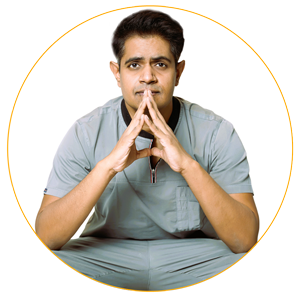
Best plastic surgeon, Dr. Amit Agarwal is an American Board Certified, extensively trained, and best Plastic & Aesthetic surgeon in Lucknow. He is the Chief Plastic Surgeon heading the Department of Plastic, Microvascular, and Craniofacial surgery at Vivekananda Polyclinic and Institute of Medical Sciences, Lucknow, U.P, India. He maintains a busy practice at Avadh and Nishat Hospital and his own center - Kayakriti Plastic Surgery & Dental Center. He was formerly a Consultant in the Department of Plastic Surgery and Burns at the prestigious SGPGI, Lucknow.
MS, DNB (General Surgery) MCh, DNB (Plastic Surgery),
MNAMS, FACS, FICS, FRCS (Edinburgh, UK)
His Credentials
Three pillars of kayakriti
Privacy
We believe your experience with us should be comfortable and hassle-free to make it one of your best lifetime experiences for yours. We, here at the clinic, take full precautions to maintain your privacy in any manner. We also provide a staff who will receive you from the gate and take you to the chamber directly if you demand.
Trust
Our Surgeon is highly qualified and internationally certified with a team of skilled staff to perform any surgical or non-surgical treatment on your body.
Safety
When you plan to undergo any surgery you should always keep in mind that it's your body and it's a surgery. We, here always keep your safety a priority and will never recommend you to undergo any such procedure which is not safe for you. We also provide you with a detailed description of the complications which may occur after the surgery during the consultation as it's a surgical procedure so there may be some complications depending on the way your body reacts.
Kayakriti in news



Frequently Asked Questions
If you have flat or small breast and you want to improve your breast and hip contour ratio then you are a good candidate for it. The answer will be best provided after the first consultation with Dr Amit Agarwal.
Acute pain will be there for almost a week which gradually reduces and there will be soreness and swelling which may take up to 3 weeks to subside.
You can join your work and daily routines after a week of the procedure and can start exercising after 3 weeks of it.
Yes, you have to wear it round the clock unless we suggest you to remove it.
This surgery does not affect the ducts or the areas of the breast involved in milk production. Thus, it does not affect the breast feeding.
This surgery does not affect the ducts or the areas of the breast involved in milk production. Thus, it does not affect the breast feeding.












Kayakriti Plastic Surgery & Dental Center
D-43, Near Punjab National Bank, Rajajipuram, Lucknow, Uttar Pradesh - 226017, India
Phone No. +919695940009, +919695940006
Map Location

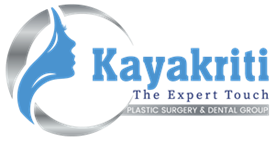


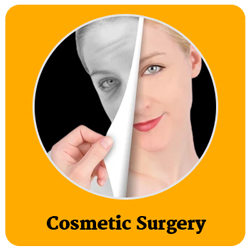
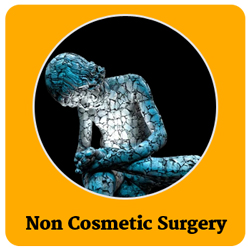























Social Media Presence